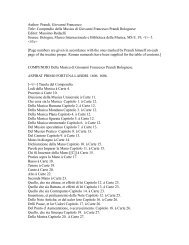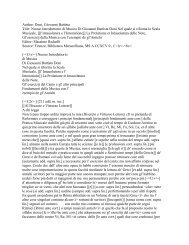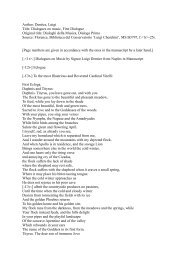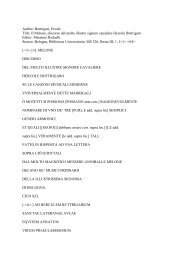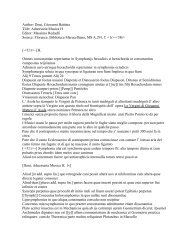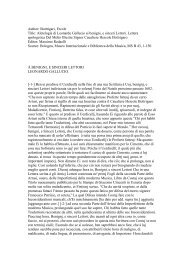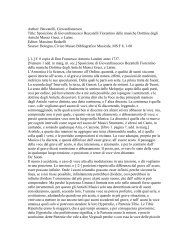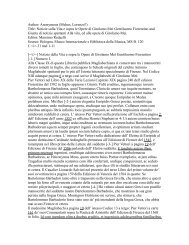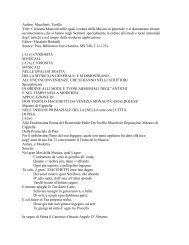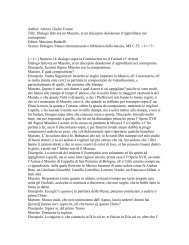Author: Doni, Giovanni Battista - manuscripts of italian music theory ...
Author: Doni, Giovanni Battista - manuscripts of italian music theory ...
Author: Doni, Giovanni Battista - manuscripts of italian music theory ...
You also want an ePaper? Increase the reach of your titles
YUMPU automatically turns print PDFs into web optimized ePapers that Google loves.
down to our times a good portion <strong>of</strong> those which were composed in antiquity in a very<br />
large number on the parts or specialities <strong>of</strong> it, since it was very well regarded in those<br />
days not less than it is now. But, on the contrary, among all those so noble writers<br />
who wrote works on <strong>music</strong> [[(one has to say this in order to be impartial)]] a very<br />
small part has survived after so many destructions and fires that destroyed entire cities<br />
and provinces for many centuries. An even smaller part has managed to survive<br />
beyond dark and uncivilised that followed the destruction <strong>of</strong> the Roman Empire and<br />
to reach our age. But, since this is not overly our concern, I say that the most<br />
important and fundamental part <strong>of</strong> <strong>music</strong>, as Aristoxenus explains at the beginning <strong>of</strong><br />
his Harmonics, is that is called Harmonic, on which we have only three books (albeit<br />
incomplete) <strong>of</strong> the Harmonic Elements <strong>of</strong> Aristoxenus, who is the prince, in my<br />
opinion, <strong>of</strong> all the <strong>music</strong>ians that have been and ever will be. However, also the three<br />
most erudite and subtle Harmonics by Ptolemy with Porphyry's most learned and<br />
ample commentary which is in the Vatican Library and in others, and, besides, the<br />
Latin work f Boethius and some [--] other Greek Writers who (from Aristides<br />
Quintilianus onwards, who deals equally <strong>of</strong> Rhythm and Meter) do not deal with the<br />
other parts very widely, but discuss on Harmonics succinctly, but with good order and<br />
solid doctrine derived from earlier authors who dealt with <strong>music</strong>al matters more<br />
extensively. But, since these books are buried in libraries for the most part, as it is the<br />
case <strong>of</strong> Aristides and Porphyry, or since they have been translated very badly, as it has<br />
happened to the Harmonics <strong>of</strong> Aristoxenus and Ptolemy, hence has happened that the<br />
doctrine <strong>of</strong> the Genera and the Modes has not been understood fully until now.<br />
[--] What is the Harmonic part <strong>of</strong> Music and which elements it contains with<br />
particular reference to the Systems<br />
Chapter Two<br />
From what has been said so-far, one can easily gather [[what we were saying in<br />
particular, and, consequently, that, among the parts which constitute Music a very<br />
important one , or rather, the most important <strong>of</strong> them all is the one which is called<br />
Harmonics, as it deals with Harmony, which is so important in this field]] that<br />
Harmonics are the most important part <strong>of</strong> Music, [[despite the fact that I said little<br />
about what it is and its whole content, it being almost the fundamental and almost the<br />
content <strong>of</strong> all <strong>of</strong> it]] or rather it is absolutely the first and most important, just as the<br />
subject [[on which its]] itself is which it deals with, considering it with all its<br />
properties and relative features. One has to know that Aristoxenus (who weaved his<br />
doctrine with wonderful order and method following in the steps <strong>of</strong> Aristotle, who<br />
was once his Teacher) at the beginning <strong>of</strong> the second book divides it into seven parts.<br />
After him Aristides and the others who wrote after him did the same. The first part<br />
deals with the Genera, the second part deals with the intervals, the third one with the<br />
sounds, namely the notes that can be sung, the fourth with the Systems, the fifth with<br />
the Tones, the sixth with the Mutations and, finally, the seventh with the Melopoeia or<br />
art to create [--] a song. Now, it is necessary to say something about what is not<br />
understood usually in this Division, as a form <strong>of</strong> respect towards persons who are less<br />
expert in this. In Music the distances that are between a note and another one which<br />
differ as to high and low pitch are called Intervals. Some <strong>of</strong> these are consonant, as<br />
the interval <strong>of</strong> tow tones, which is called Ditone, the one <strong>of</strong> one Tone and a half,<br />
which is called Semiditone, the one <strong>of</strong> three Tones and a half, which is called<br />
Diapente, and so forth. Other intervals are dissonant, such as a semitone, a Tone, a



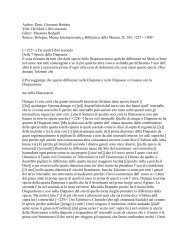
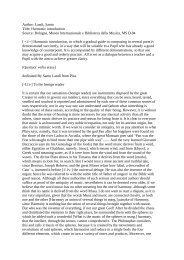
![Doni, Giovanni Battista Title: Trattato Dei Tuoni o [[Harmonie de]]](https://img.yumpu.com/45461005/1/190x245/doni-giovanni-battista-title-trattato-dei-tuoni-o-harmonie-de.jpg?quality=85)
